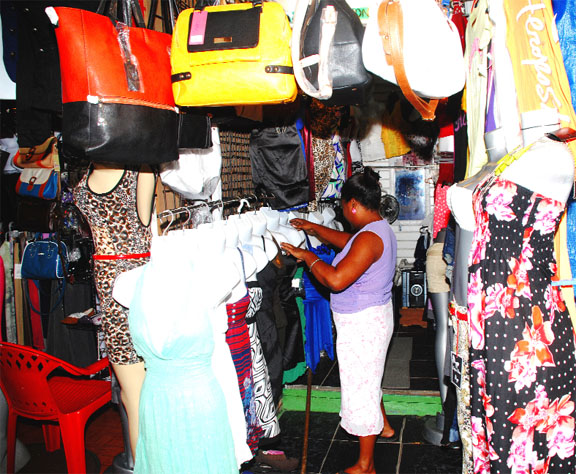By Nicola Telford
There is a distinct pattern to the types of small businesses that have mushroomed across Guyana. In the capital, Georgetown, coastal communities, and established townships an assortment of small businesses – store-fronts, pavement dwellers, suitcase dealers and peddlers has mushroomed.
The government has taken aim at the small illegal constructions that have sprung up to support these businesses. Pockets of illegality, manifested in the encumbering of legitimate business premises, abound.
The investors in these enterprises belong to the vast army of the unemployed. They have found, however, that doing business is no walk in the park. The main deterrent to successful business ownership is finance. Commercial banks are by no means the best-known risk-takers. There is talk about reviving the cooperative movement; though its track record raises considerable doubt in people’s minds. Most appear to prefer to ‘hack’ it alone.
Among the businesses that have blossomed in Guyana in recent years; clothing and beauty, food vending, vehicle maintenance and repairs and information technology have realised the strongest growth. Inevitably, competition is fierce and not all of these enterprises are successful. In fact, many come and go with monotonous regularity. Part of the problem has to do with a lack of business experience on the part of these ‘triers.’ Orthodox entrepreneurship is a far cry from simply catching your hand.
‘Box hands’ or ‘sous sous’ are still common among small business owners. This system of communal financing has done much to hold the small business community together in circumstances where it does not qualify for loans from the established system.
The work of the Institute of Private Enterprise Development (IPED) and a handful of other lending agencies, coupled with the role being played by external funding agencies have helped to build the profile of the small business sector. The advent of the Small Business Bureau with its commitment to supporting loan applications to commercial banks by small business is also likely to generate greater interest in investment. Other possible solutions to problems associated with a lack of finance are the formation of trade associations, cooperatives and the creation of small business associations across the regions, though it ought to be borne in mind that these institutions need to be properly managed if they are to achieve their objectives.

What has also been determined is that the challenges facing small sole-proprietor enterprises will not be overcome until they are better managed.
Recently, a Regent Street storefront technology proprietor, whose business includes repairs, sales and purchases of cell phone accessories, told this newspaper that the commercial banks having turned him away he was forced to “throw a box hand” to stock and restock his shop. The businessman says that he has been ‘on the high street’ for six years and has managed to stay afloat without the aid of any lending institution.
Another business owner, a Stabroek Market vendor, related a similar experience of having to resort to the informal lending culture of the ‘box hand’ to set out her stall. In fact, what this newspaper has discovered is that scores of vendors in arcades and marketplaces are involved in daily ‘box hand’ arrangements with the ‘hands’ ranging from $1,000 to as much as $5,000 per day. These amounts are used to re-stock stalls. Many of the vendors are parents of several school-age children. Some of them live on the breadline with today’s takings only sufficient to take care of today’s needs. Tomorrow is, quite literally, another day. Our vendor has five children and she sells bags, confectionary and sodas and whatever else can bring her a dollar.
On the West Coast Demerara, at the old Transport and Harbours wharf, food vendors and traders in clothing and shoes congregate. Many of them resorted to trading having been unable to secure paid employment. Others simply cannot afford to feed themselves and their families on salaries. Trading offers a way to pay their bills and feed their children. Some of them receive their stocks in barrels posted from the United States and Canada. Sometimes they vend from the barrels in which the items were posted with their names and addresses still written on them. They too operate ‘box hands’ to sustain their businesses. Most lending institutions, they say, pay no attention to them.
Two of stallholders said that after they had built their businesses and met the requirements of the commercial banks they had applied for and secured loans. They recall not liking the bureaucracy.
Linden sometimes seems to be the small business Mecca of Guyana. Unemployment in Linden probably exceeds 50 per cent and small business pursuits are among the few legitimate options.
There is an assortment of hairdressers, clothing vendors, mechanics and car-wash operators. Some of their enterprises are micro businesses that appear worryingly fragile.
It is the way of life in Linden. Some of the mechanics do relatively well. Patronage derives from the current influx of used cars into the country. Car wash and vehicle repair services are also popular. There is never a shortage of truck engines and land dredges that are in need of repairs.
Clothing vending is trickier business. Linden being a small community it is quiet tricky to determine what to stock given that clothing sales are seasonal; dependent on the entertainment timetable in the community. It’s the same with hairdressing. Work is seasonal and competitive. The hairdressers said they make it through, themselves, being very competitive; most of their clients also operate on shoestring budgets. The small business owners grumble about the lack of employment opportunities. They point out that unemployed persons are unreliable patrons.
No major new businesses ever open in Linden. The smaller enterprises emerge thick and fast. Because Linden is a small community the opening of a new enterprise means that patronage must be spread even thinner. A striking feature of the small business development within the community is that most of the owners were aided in the set up of their businesses by relatives residing out of Guyana.








